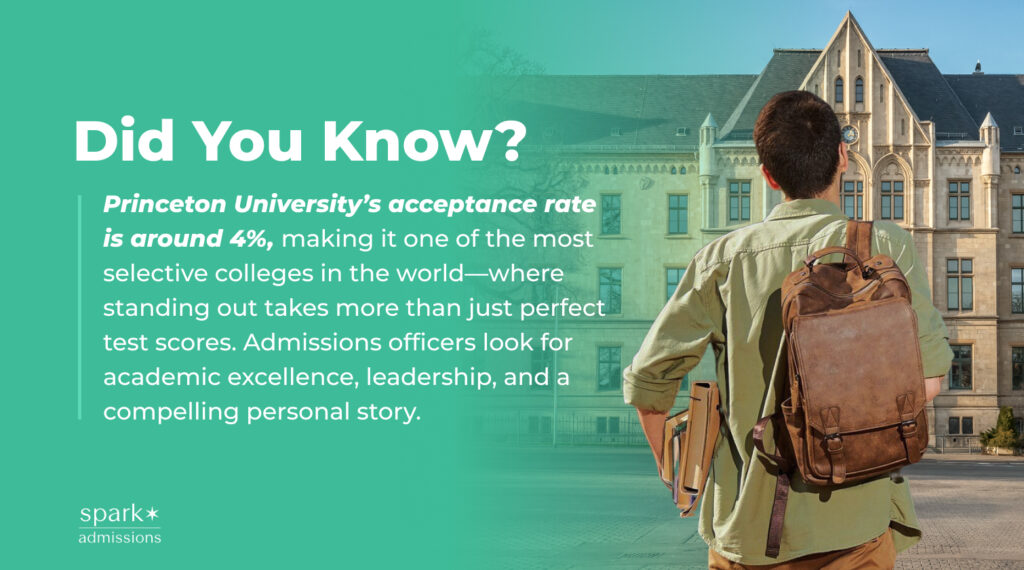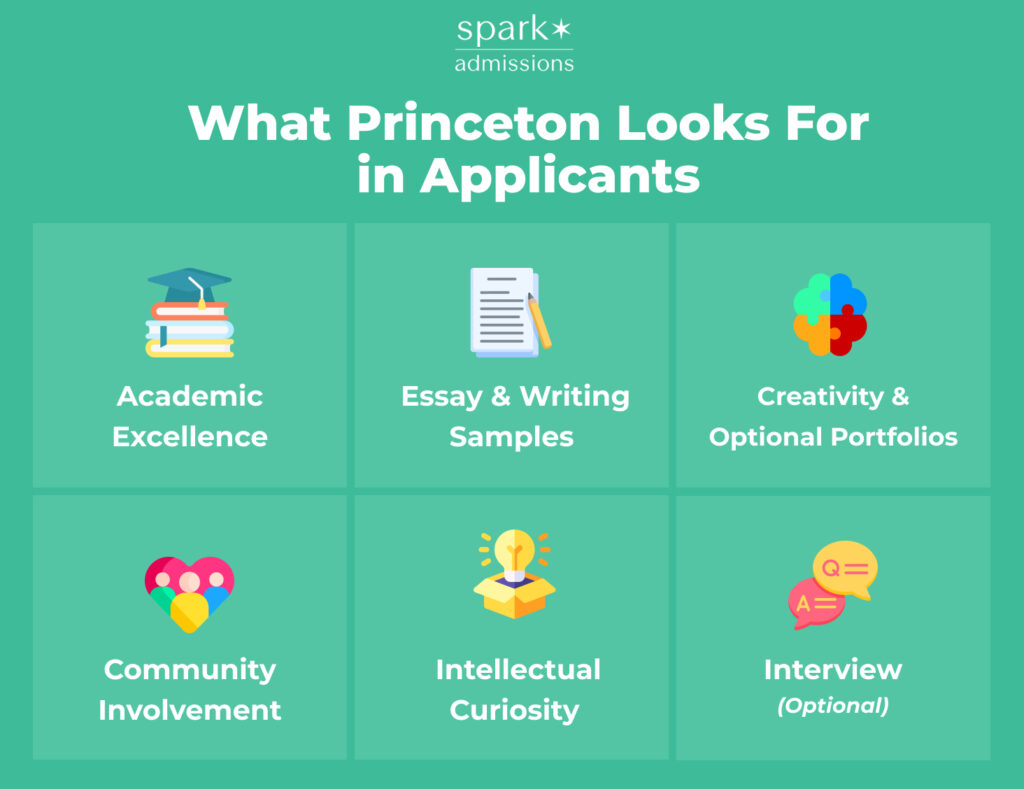
For thousands of students applying to elite institutions each year, the question remains: How difficult is it to gain acceptance? As one of the most prestigious Ivy League schools, Princeton University is known for its rigorous admissions process, exceptionally low acceptance rate, and high expectations for academic excellence and intellectual curiosity. In this guide, we’ll explore everything you need to know about Princeton admissions, from test scores and extracurricular activities to the Princeton essay and interview.

Princeton’s Acceptance Rate and Selectivity
How hard is it to get into Princeton? Extremely. The Princeton acceptance rate consistently ranks among the lowest in the country, typically hovering around 4% in recent years. This level of selectivity places Princeton University among the Top 50 most competitive institutions globally and solidifies its reputation as a premier Ivy League school.
Understanding Princeton’s Overall Acceptance Rate
Each year, tens of thousands of students apply to Princeton University, but only a small percentage are accepted. The overall Princeton acceptance rate has dropped steadily due to increased interest, higher application numbers, and the university’s commitment to enrolling an outstanding and diverse incoming class.
Despite the test-optional policy, many successful Princeton applicants still submit scores, and those with strong SAT and/or ACT scores and a high GPA tend to stand out. But getting into Princeton requires more than academic statistics alone—it demands holistic excellence.
Early Action vs. Regular Decision
While Princeton no longer offers Early Decision, it does have a Single-Choice Early Action (SCEA) option. This plan is non-binding but limits you from applying early to other private institutions.
The Early Decision acceptance rate (now Early Action) is historically slightly higher than the Regular Decision rate, but not by much.
Early applicants benefit from showing strong interest in the school, and many have already achieved near-perfect scores on standardized tests and excelled in their academic performance.
Applying Early Action can offer a strategic edge, especially if Princeton is your dream school, but competition remains fierce.
Academic Excellence and More
Princeton’s admissions process emphasizes academic excellence, but the admissions committee also seeks out well-rounded individuals. Most admitted students have the following:
- Near-perfect SAT or ACT scores
- Exceptional academic achievement and a rigorous secondary school transcript
- Impressive extracurricular accomplishments, including leadership, community service, and/or artistic achievements
- Evidence of intellectual curiosity through research, independent study, or a senior thesis
Simply put, gaining acceptance to Princeton means demonstrating that you are not only academically prepared but also ready to contribute meaningfully to the Princeton community.
It’s More Than a Numbers Game
Yes, high test scores and a strong GPA are essential, but they won’t guarantee a spot. The admissions officers at Princeton take a holistic approach to reviewing each Princeton application. That includes evaluating your Princeton essay, personal statement, graded written paper, extracurricular activities, and interview performance.
In a sea of highly qualified applicants, standing out often comes down to your story—how you articulate your values, experiences, and vision for the future. That’s why civic engagement, leadership, and academic achievements beyond the classroom can tip the scale.

GPA and Standardized Test Expectations
One of the most important factors in the Princeton admissions process is academic performance. Although Princeton University does not publish formal GPA requirements, the academic profile of admitted students speaks volumes. Successful Princeton applicants almost always demonstrate consistent academic excellence, often achieving a high GPA of 4.0 or above on a weighted scale.
Princeton GPA Requirements and Academic Rigor
While there are no set Princeton GPA requirements, applicants who are seriously competitive for admission have typically achieved academic excellence across all four years of secondary school.
This means earning top grades in challenging courses, including Advanced Placement (AP), IB, or honors classes, excelling in core subjects like laboratory science, foreign language, natural sciences, and liberal arts, and demonstrating a sustained upward academic trend or consistently high academic achievement.
The admissions officers at Princeton want to see that you’ve pushed yourself within the context of your school’s offerings and performed at the highest level available to you.
SAT and ACT Scores
Although Princeton University has adopted a test-optional policy in recent cycles, standardized test scores remain an important aspect of many Princeton applications. Submitting strong SAT scores or ACT scores can strengthen your application and help you stand out in a highly competitive pool.
Here’s the middle 50% range for recently admitted students:
SAT scores: 1460–1570
ACT score: 33–35
These high test scores reflect the level of academic preparation expected at an Ivy League school like Princeton. Students with near-perfect scores are common among those who eventually gain acceptance.
If you choose to submit scores, make sure they reflect your capabilities. If not, your academic achievements, extracurricular accomplishments, and personal essays must strongly demonstrate your readiness and intellectual potential.
The Role of Standardized Test Scores in Holistic Review
The Princeton admissions committee uses a holistic review process, meaning standardized tests are considered in the context of your full application. Even if you don’t submit scores, your academic rigor, course selection, and class ranking will be closely evaluated.
That said, applicants with high SAT scores or a top ACT score can boost their academic profile, especially in the absence of other standout achievements. When submitted, standardized test scores help confirm a student’s ability to thrive in Princeton’s academically intense environment.

What the Admissions Committee Looks For
The Princeton admissions team uses a comprehensive, holistic review process to evaluate each applicant. Rather than relying solely on SAT scores, ACT scores, or a high GPA, the admissions officers aim to understand each student’s academic, personal, and social contributions.
A strong academic record is still critical—secondary school performance is carefully reviewed through transcripts, your school report, and your course rigor. While Princeton GPA requirements aren’t fixed, admitted students typically have excelled in the most challenging courses available at their high school.
In addition to academics, the Princeton admissions team looks closely at how applicants distinguish themselves outside the classroom.
Your Princeton Essay and Supplemental Materials
A thoughtful and well-crafted personal statement and a graded written paper offer insight into your analytical abilities, communication skills, and writing style.
The Princeton essay and supplemental materials are some of the most revealing. They allow you to go beyond your academic achievements, standardized test scores, and resume to show admissions officers who you really are. The personal essay provides a platform to express your values, reflect on your experiences, and share your intellectual passions. Whether or not you choose to submit scores, this portion of the application is where your voice and authenticity can shine.
As an applicant, you must also submit a graded written paper, usually from an English or history class, which helps the admissions committee evaluate your academic writing skills in a real-world classroom context. Alongside the personal essay, Princeton requires short-answer responses. These brief essays ask you to reflect on your role in your community, your academic interests, and how you’ll engage with campus life at Princeton.
For those applying to programs with an artistic focus or for students with strong creative portfolios, optional materials such as submissions in visual arts, music, or liberal arts fields may also be included. While not required, these pieces can strengthen your application by highlighting unique personal achievements and creative potential.
Community Involvement Matters
A long-standing commitment to community service and civic engagement is also viewed favorably, as it aligns with Princeton’s mission to cultivate global citizens and compassionate leaders.
What truly sets apart successful Princeton applicants is evidence of intellectual curiosity, with the desire to explore ideas deeply, ask thoughtful questions, and pursue learning for its own sake. Whether you’ve conducted research, started a club, explored a new language, or completed a senior thesis, the admissions committee wants to see how your curiosity drives your growth and impacts your community.
Face-to-Face Interviews
When available, a Princeton interview, typically conducted by alumni, is another opportunity to present your personality, motivation, and interest in the Princeton community. The interview is not required, but it can positively influence the final decision by adding a human dimension to your application.
Financial Aid and the Princeton Commitment
For both domestic and international students, financial aid plays a significant role in attending Princeton. The Ivy League university offers one of the most generous financial aid programs in the nation, meeting 100% of demonstrated need with grants, not loans.
Whether you’re planning to pursue a graduate degree, participate in campus life, or complete a senior thesis in natural sciences, foreign language, or liberal arts, Princeton ensures that financial need never stands in the way of your dreams.
Is It Worth Applying?
Applying to your dream school is a transformative and necessary step in your college admissions journey. If you’ve achieved academic excellence, have strong SAT or ACT scores, and demonstrate a passion for learning and leading, applying to Princeton could be a worthwhile step toward your dream school.
Let Spark Admissions guide you through the Princeton application process. Our team of experienced counselors, including former admissions officers, can help you build a competitive strategy, refine your personal statement, and shine in your Princeton interview. With personalized support, you’ll be well-positioned to join the next incoming class of Princeton University.


